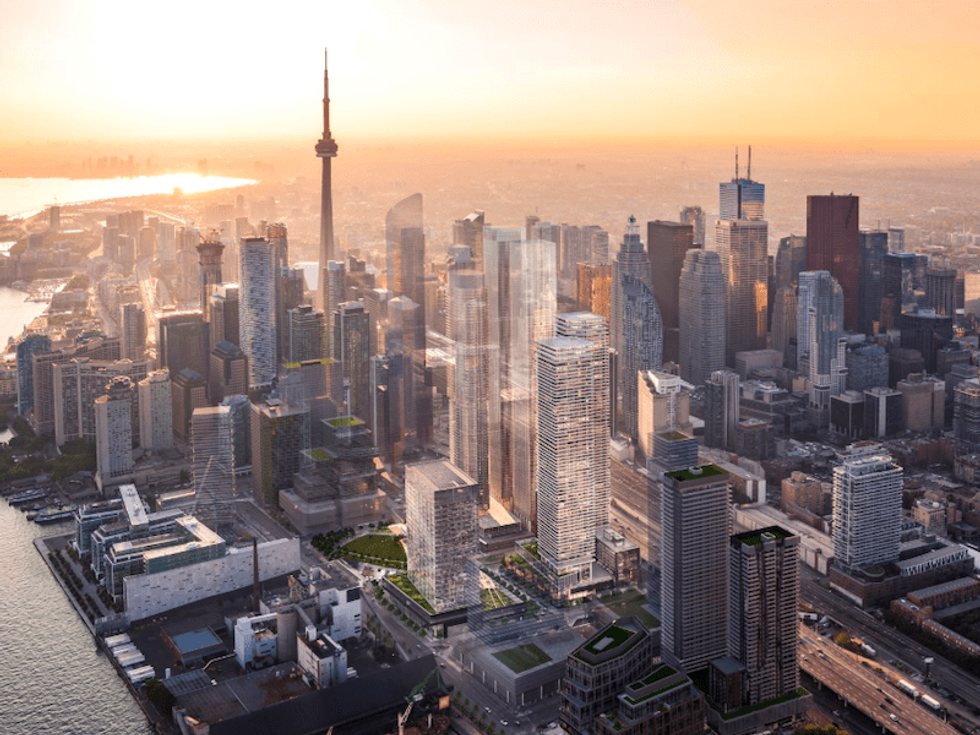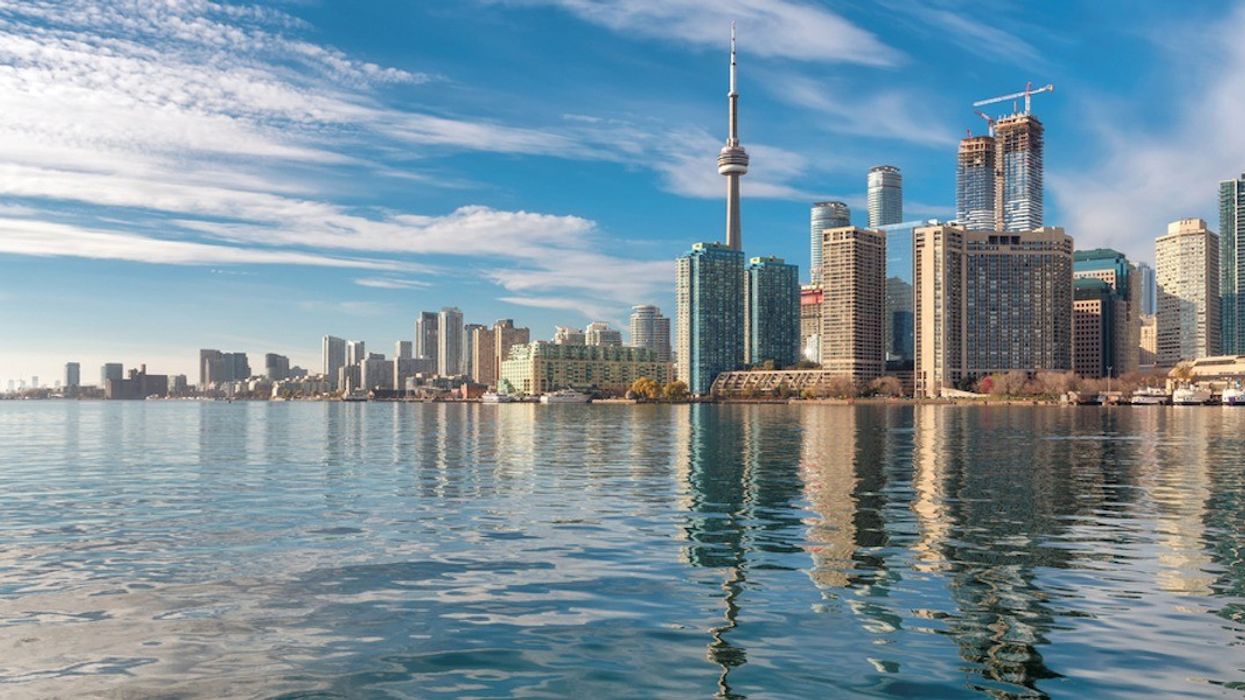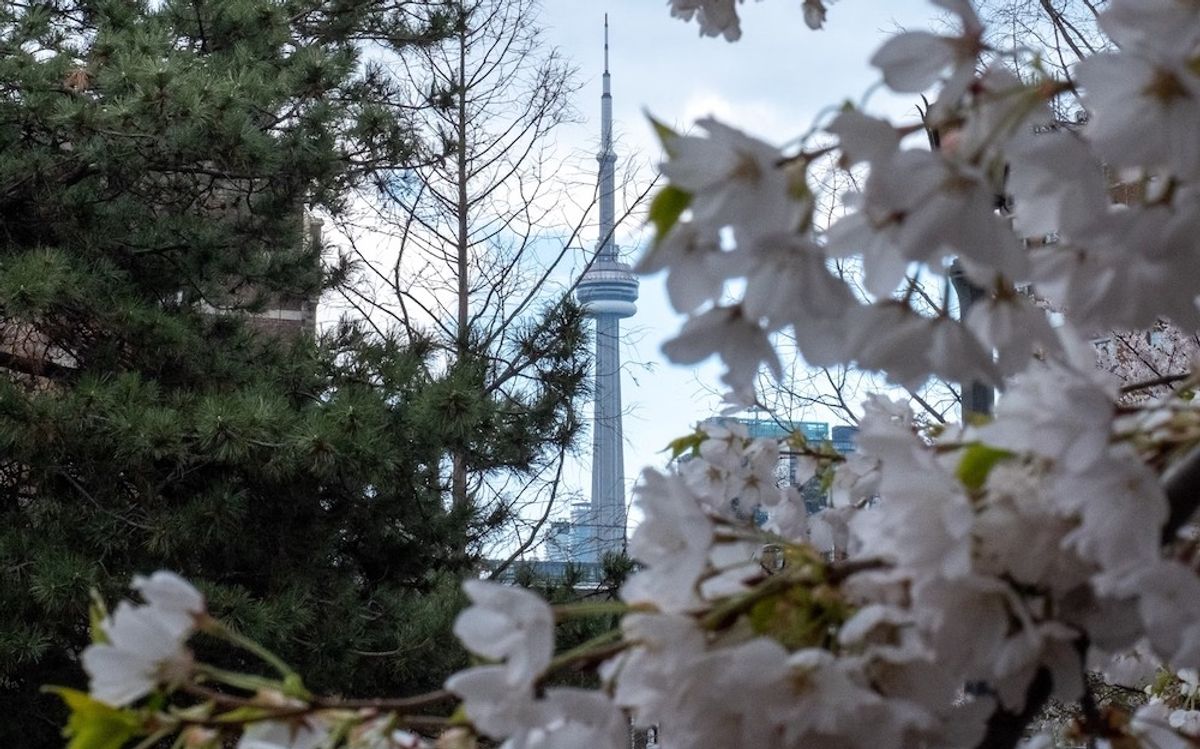Last week, we reported that, after sitting idle for the better portion of 2020, downtown Toronto's commercial real estate scene has begun to stir.
The first major sign of office space getting some new life in the COVID era was the significant announcement from Menkes that 100 Queens Quay East will be the new home of Richardson Wealth (formerly Richardson GMP Limited).
READ: Does Toronto’s First Major Commercial Lease Signed During COVID Signal a Return to Downtown?
The address Richardson Wealth will be moving into is the first phase of Sugar Wharf, Menkes’ vibrant new mixed-use community, which includes office, retail, and residential spaces, as well as Toronto’s first vertically-integrated school and a two-acre public park.
Ray Wong, Vice President, Data Operations, Data Solutions at Altus Group, felt that the announcement from Menkes was "very positive."
“I think that there’s still a strong demand for office. We’ll see a shift going into next year. It’ll be interesting to watch and see, when the vaccine is rolled out, how we continue to interact and be involved with office spaces.”
Lucky for the most eager spectators, it appears we won't even need to wait until 2021 to see such shifts; according to the multi-disciplinary real estate development company's vice president of office/retail, Sean Menkes, the "thaw" has already begun.
"With the onset of the pandemic, like every other industry, every business was on pause. Nobody knew how to act, or what to react to, because it was complete unknown territory... but what made Richardson Wealth so significant, and this transaction so significant, is they pressed ahead. We started conversations very early in 2020, and there was certainly a pause of a couple weeks, but they picked up very quickly thereafter, and I think that speaks to great leadership and a company that's going to invest in itself and in its future."
Sean explained that Richardson approached this opportunity as a chance to reset; fitting, considering the company was already in the midst of major reorganization, including selling part of the business in 2019 and integrating a name change, transitioning from Richardson GMP to Richardson Wealth. And while the wealth management firm has taken the lead where post-pandemic commercial moves are concerned, he doesn't expect the corporation will stand solo for long.
"This is a company that's the first, but it's not going to be the only one," Sean said, explaining that he foresees a bounce-back into the realm of commercial real estate happening in... wait for it... waves.
But, take heart, these tides will be more positive than the ones we've come to know through 2020.
"I think Richardson was in the first wave of companies that, at the outset, knew where their companies were heading and continued down that path. The second wave is companies that found optimism in how the summer played out, with very low case-counts and some of a return to work, and I think some of those companies are the ones that are transacting today or at least this fall," Sean says.
"And I think the next wave is, now that there's a vaccine -- I'm seeing already, I have tours scheduled for this week and next, and into the new year -- people are starting to take off the caution tape, and starting to think about their future."
Looking Ahead

Walking back into offices, be it in this coming spring, or fall, or in 2022, will surely feel at the same time familiar and brand new. Some of that sense will stem from the spaces themselves being reconfigured to meet increased health and safety expectations; Sean notes that, while health and safety have always been top-tier priorities for tenants renting commercial spaces, those facets are now the first priority. The importance of air quality and natural light come before the importance of price per square foot, he says, with HVAC, filtration levels, and circulation top of mind.
But another important aspect of what the return to office spaces will feel like undoubtedly hails from us, as individuals and as a collective, being different than we were pre-pandemic. And according to Jamie Grossman, Managing Principal at Cresa’s Toronto office, these changes mean a rare chance that we shouldn't take for granted.
"I'm not so sure we were normal before -- we were caught in an evolution of what we just always did. There's a real opportunity now. There's enormous opportunity for us to use technology that's existed for a long time. There are opportunities not to get on an airplane to have a two-hour meeting anymore," he says.
"This whole thing has brought people together to be more thoughtful about slowing down, and bringing friends and family back into their lives a little bit more, because of how hard it is to work in this city. How do you get back to having such a vibrant, great city, with energy, and so many people succeeding and advancing their lives, but doing it in a more effective and efficient way with less waste and more wellness? Both mentally, and physically."
The answer might exist in Sugar Wharf, and developments like it. With consideration to yes, work, but also to amenities, home comforts, and -- importantly -- access to nature, a sprawling community that seamlessly introduces individuals' needs to the readily-available resources Toronto has to offer checks boxes that many may not have even realized were sitting barren in their lives.
"The pace of change on the waterfront is remarkable. It's not the waterfront of a decade ago, five years ago, or last year. There are tons of residents who are moving in, companies such as Richardson Wealth, but alsoWPP,MaRS, andToronto Region Board of Trade, who are also moving into our buildings on the waterfront. They're choosing this location because it provides everything that they're looking for and that their employees are looking for," Sean explains.
With a community such as this one, it barely matters if a return to office comes full-force and promptly, or -- as Ray Wong suggests -- if the next phase incorporates increased flexibility for employees, with remote-work and co-working spaces taking up more space in the corporate world. Either way, an environment like Sugar Wharf supports individuals' needs, pace, and productivity, all of which will demand respect as the city at large works towards its collective post-pandemic goal: healing.
"Having our sports teams back, having people feel safe being in groups... I think the goal is a humanity goal, but I think what happens is as those things happen, so too will the office markets and the retail and the restaurants and the arts and the condos, it's a tide that rises and goes together. It's such an interconnected web," Grossman explains.
"The goal is to safely elevate, over time, as close back to that energy [as possible], and that's the norm. To me, the 'normal' part is that ecosystem building upon itself in a positive way versus a negative way."
Large as it may be, Toronto -- with its ecosystem of lives, structures, transits and energies that thrive because of one another -- could be called a microcosm of the vast Great Lake that crashes against the city's shores. Lake Ontario serves as a reminder of the importance of honouring beauty, rhythm, and natural processes in the best of times, but even more-so as we reel from the impacts of a global pandemic rocking our world for the better part of a year.
Tim Kocur, Executive Director at Waterfront BIA, notes that the bustling nature of the waterfront trails through 2020's summer months -- Labour Day weekend, in particular, saw more than 39,000 visitors to the picturesque area -- making a solid case for an innate pull many have felt toward back-to-nature experiences this year. And now, with a freshly-booming east Bayfront pocket of the city, Torontonians corporate and non-corporate alike will only have more reasons to experience the neighbourhood more often.
Sean notes that even over the course of the last nine months, as buildings have been completed along the waterfront, the area has already seen major positive transformation.
"It's a different city, and [for those who haven't visited in a while,] it's something that is worth the drive," he says. "I think people in Toronto are going to be proud of what's going on down there."





















